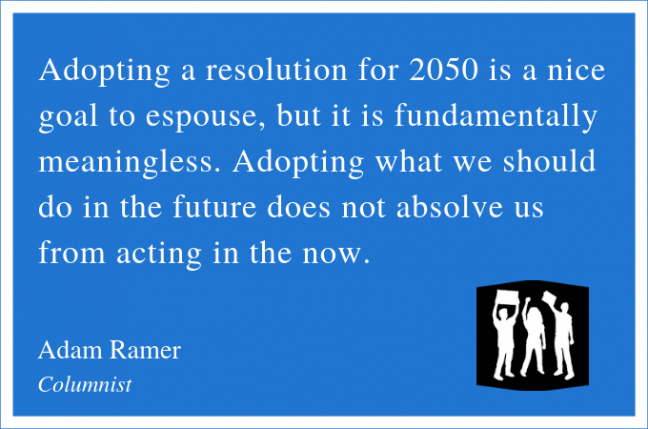In the whirlwind of the federal government shutdown, it was easy to lose track of all the forward-thinking legislation that the new, young, left-leaning coalition of Democrats in the House is putting forward, such as the Green New Deal, which has recently been gaining steam and popularity.
Unapologetic and determined, Rep. Alexandria Ocasio-Cortez, D-New York City, has been one of the voices advocating for the proposal, which has correlated to a major influx in Green New Deal mentions on Twitter.
…and we have #GreenNewDeal lift-off! 🌎🚀
Never underestimate the power of public imagination. pic.twitter.com/h4PqqPucEX
— Alexandria Ocasio-Cortez (@AOC) December 14, 2018
In short, the Green New Deal is a proposal to propel the country toward a more environmentally sustainable society, with an emphasis on reducing structural inequality in the process. Better yet, it’s popular too.
Data For Progress, a left-leaning statistical policy site which aims to bring social awareness to political polling, conducted research on four key policies in the deal, and found they all “have greater than 55 percent support in the median state.” This is important, as it shows that people demand, and are ready for, environmental change. But to mitigate the effects of climate change, it is imperative that every city, every institution and every person fight for a complete overhaul of the system.
That’s where the University of Wisconsin comes in. Based on both reputation and exit polls, Madison is overwhelmingly left-leaning. Over the years, UW has earned the title of a “liberal campus.” Essentially, that means the city and its institutions should be driving progress.
Wisconsin universities aim to help environment through variety of projects
And, to a degree, they are. The UW Faculty Senate passed a resolution November 2017 urging the university to become carbon-neutral by 2050. This is a major step in the right direction, but it’s not enough. It’s not quick enough to achieve anything other than a half-assed pat on the back in 30 years, with comments to the effect of, “Well, we tried,” as climate changes continue toward the point of no return.
For the health of our community, our school and our planet, it is imperative that UW adopt a bold Green New Deal of its own, aiming for far more ambitious goals than those previously set. UW must allocate all necessary resources to ensure immediate, substantial change.
Adopting a resolution for 2050 is a nice goal to espouse, but it is fundamentally meaningless. Adopting what we should do in the future does not absolve us from acting now. It doesn’t come down to financial guidelines or what’s considered possible — adopting new policies for the next few years, instead of the next few decades, is more important than the bottom line.
It’s not too bold of a decision, either. This April, American University in Washington, D.C., announced it had reached carbon-neutral status, a few years ahead of their 10-year plan to do so.
“AU works to reduce energy use per square foot and produce renewable energy on campus and within its electricity grid,” American University said. “The university purchases renewable energy and offsets to balance the greenhouse gas emissions it produces. Fifty percent of AU’s electricity comes from solar power sources.”
Walker doesn’t care about environment, but luckily, Madison does
Other universities across the country, ranging from public to private universities of varying sizes, have taken the pledge for carbon neutrality as well, including Cornell University, the University of Florida and New York University.
Some may say that attempting to achieve carbon neutrality is a too lofty a goal and is unattainable because of UW’s size, but that may not be the case. In a 2016 study by the Massachusetts Institute of Technology, researchers found that, while larger universities may have a harder time achieving such a goal, it is still very possible.
It’s impossible to predict what Madison or UW may look like in the next 30 years. Will the lakes flood or dry up? Will the rising temperatures ruin winters as we know it? Will there be far more tornadoes and other natural disasters? It’s impossible to know for sure, but we do know that the world is changing.
Even though it may prove difficult, the university must try to make real progress. The climate is changing more rapidly than previous predictions, and that means that the next 30 years may be unpredictable and volatile. It’s not enough to take small steps toward a goal in the distant future when those who made the goals may be long gone. The university needs to make leaps now to ensure that it does right for our community and for humanity.
Adam Ramer ([email protected]) is a senior majoring in political science and history.




















